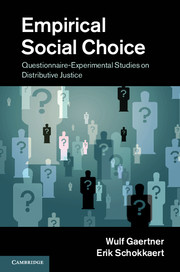3 - Traditional questions in social choice
Published online by Cambridge University Press: 05 January 2012
Summary
Social choice theory really took off with Arrow’s seminal impossibility theorem (Arrow, 1951, 1963). This statement in no way wishes to belittle the great achievements and insights gained by de Borda, Condorcet, and others several centuries ago. Arrow formulated the problem of social choice in a very abstract setting. Consider a set of social states which has to be ranked by the social planner. Suppose the only information available to construct this social ranking consists of the ordinal preferences of the individuals over the social states. How can these individual rankings be mapped into a social ranking? Arrow showed that there does not exist an aggregation procedure satisfying a set of reasonably looking axioms on a universal domain of individual preferences.
This impossibility theorem spawned a large literature, in both voting theory and in welfare economics. One influential strand of this literature built further on the insight that Arrow’s setup restricted the available information for the planner to ordinal and interpersonally non-comparable individual utilities. It is not surprising that one cannot easily rank different distributions if interpersonal comparability is banned. The so-called ‘informational’ approach to social choice (d’Aspremont and Gevers, 1977; Roberts, 1980; Sen, 1970) showed that introducing various forms of interpersonal comparability of utility made it possible to escape from Arrow’s impossibility deadlock and to formulate so-called ‘welfarist’ social objective functions. The use of the term ‘welfarist’ has recently become ambiguous, because it has received many different connotations (Fleurbaey, 2003), but its original meaning was clear: an approach is called ‘welfarist’ if only the individual subjective utilities matter for the evaluation of social states. Welfarism does allow for different attitudes towards distribution. In the specific case of utilitarianism, which defines the social objective as the simple sum of the utilities of all individuals in society, the inequality aversion is equal to zero. The economic reinterpretation of Rawls’ (1971) difference principle, in which the social objective is to maximize the welfare level of the worst-off in society, is also welfarist with an inequality aversion equal to infinity. In addition, applied work in public economics has popularized intermediate forms of concave social welfare functions with an inequality aversion between zero and infinity (see, e.g., Atkinson, 1970).
- Type
- Chapter
- Information
- Empirical Social ChoiceQuestionnaire-Experimental Studies on Distributive Justice, pp. 29 - 95Publisher: Cambridge University PressPrint publication year: 2011



